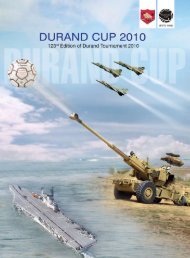Shimla-the birthplace of the Durand Cup and the Indian Air Force ...
Shimla-the birthplace of the Durand Cup and the Indian Air Force ...
Shimla-the birthplace of the Durand Cup and the Indian Air Force ...
You also want an ePaper? Increase the reach of your titles
YUMPU automatically turns print PDFs into web optimized ePapers that Google loves.
The Unforgettables...<br />
Jarnail Singh<br />
Jarnail Singh, a football legend in his lifetime <strong>and</strong> one <strong>of</strong><br />
India’s greatest footballers passed away in 2000, at <strong>the</strong><br />
age <strong>of</strong> 64. A stopper-back in <strong>the</strong> three-back system, Jarnail<br />
was a prominent member <strong>of</strong> <strong>the</strong> <strong>Indian</strong> team that won <strong>the</strong> gold<br />
medal in <strong>the</strong> 1962 Asian Games at Jakarta. Four years later he<br />
led <strong>the</strong> team in <strong>the</strong> Bangkok Asian Games. He was also <strong>the</strong><br />
<strong>Indian</strong> captain for three years in a row in <strong>the</strong> Kuala Lumpur’s<br />
Merdeka tournament in <strong>the</strong> 60s. At <strong>the</strong> domestic level, Jarnail<br />
spent his best years with Calcutta’s Mohun Bagan. Born in<br />
Lyallpur (now in Pakistan) in 1936, Jarnail Singh Dhillon first<br />
caught <strong>the</strong> eye while playing for Punjab University in <strong>the</strong> DCM<br />
tournament. He shifted to Calcutta to play for Rajasthan Club<br />
in 1957. Next year he joined Mohun Bagan <strong>and</strong> remained <strong>the</strong>ir<br />
most prized catch till he decided to go back to Punjab in 1969.<br />
At <strong>the</strong> fag end <strong>of</strong> his career but still possessing enough fire, he<br />
led Punjab to <strong>the</strong>ir first Santosh Trophy triumph in Jal<strong>and</strong>har in<br />
1970. He joined Punjab Government <strong>and</strong> retired as Additional<br />
Director (Sports).<br />
M. Kempiah<br />
M.Kempiah, <strong>the</strong> stalwart <strong>of</strong> <strong>Indian</strong> football passed<br />
away on 3rd July, 2008 at <strong>the</strong> age <strong>of</strong> 75 at Bangalore<br />
A box to box midfielder who excelled in defensive<br />
qualities he stole <strong>the</strong> eye <strong>of</strong> <strong>the</strong> pundits with his<br />
uncanny anticipation <strong>and</strong> neat tackling much so that he not<br />
only became a permanent feature but also an asset to <strong>the</strong><br />
<strong>Indian</strong> side. Kempiah aptly fit into <strong>the</strong> role <strong>of</strong> a defensive<br />
half back in <strong>the</strong> 3-2-5 formation. He made his international<br />
debut in <strong>the</strong> 1955 Quadrangular football tournament. At <strong>the</strong><br />
International level, he is capped twenty eight times by <strong>the</strong><br />
country - being <strong>the</strong> member <strong>of</strong> <strong>the</strong> <strong>Indian</strong> team in <strong>the</strong> Olympics<br />
(1956, 1960), Asian Games (1958), Asia <strong>Cup</strong> (1959), Merdeka<br />
tournament (1959.1961) <strong>and</strong> Pre Olympics (1959,1960,1963).<br />
He also scored his only international goal vs Afganisthan in<br />
Jia’s 5-2 win in Pre Olympic tie in Kabul in 1959. At <strong>the</strong> club<br />
level he shot into prominence with Bangalore Muslims from<br />
1953-55. In <strong>the</strong> following year he shifted to <strong>the</strong> Mecca <strong>of</strong> <strong>Indian</strong><br />
Football, Kolkata <strong>and</strong> joined East Bengal. He helped <strong>the</strong> elite<br />
club win <strong>Dur<strong>and</strong></strong> <strong>Cup</strong> <strong>and</strong> P.K.Nair Gold <strong>Cup</strong> that year. In 1957<br />
he switched over to Mohun Bagan <strong>and</strong> stayed with <strong>the</strong>m till he<br />
hung up his boots in 1964.<br />
20 July 2011 purple beret<br />
Ashoklal Banerjee<br />
Ashoklal Banerjee was 64 when he passed away<br />
in 2008. He started his footballing career in <strong>the</strong><br />
Kolkata maidan in <strong>the</strong> mid sixties as a defender. He<br />
first drew attention while playing for Kidderpore<br />
Club <strong>and</strong> switched over to East Bengal Club in 1968 to fill <strong>the</strong><br />
vaccum created by <strong>the</strong> sudden departure <strong>of</strong> legendary stopper<br />
Nayeem. He went back to East Bengal in 1971 <strong>and</strong> was a part<br />
<strong>of</strong> <strong>the</strong> glamour outfit till 1976. He achieved many laurels with<br />
<strong>the</strong> club winning <strong>the</strong> Calcutta League continuously from 1971-<br />
75 <strong>and</strong> I.FA. shield from 1972-1976, <strong>the</strong> last year jointly with<br />
Mohun Bagan. He famously captained <strong>the</strong> red <strong>and</strong> golds in<br />
triumph over arch-rivals Mohun Bagan in <strong>the</strong> finals <strong>of</strong> <strong>the</strong><br />
1975 Shield. He also won <strong>the</strong> <strong>Dur<strong>and</strong></strong> <strong>Cup</strong> with <strong>the</strong> Club in<br />
1972 <strong>and</strong> performed consistently throughout <strong>the</strong> tournament<br />
that year. He also won <strong>the</strong> Rovers <strong>Cup</strong> (1973, 1975) <strong>and</strong> DCM<br />
trophy (1973, 1974). He individually had some outst<strong>and</strong>ing<br />
performances against Pyongyong City Club (1973 IFA Shield<br />
Final) <strong>and</strong> Dok Ro Gang (1973 DCM final). In 1977 he switched<br />
over to Mohammedan Sporting. He represented Bengal in <strong>the</strong><br />
Santosh Trophy from 1969-74 being <strong>the</strong> Captain. He won <strong>the</strong><br />
trophy thrice (1969, 1971, 1972). He made his international<br />
debut for India in <strong>the</strong> 1970 Merdeka <strong>and</strong> won <strong>the</strong> bronze medal<br />
that year.<br />
Noor Mohammed<br />
Aluminary <strong>of</strong> <strong>Indian</strong> football, Noor Mohammed, died<br />
at <strong>the</strong> age <strong>of</strong> 80. He played in three Olympics -1948<br />
(London), 1952 (Helsinki) <strong>and</strong> 1956 (Melbourne) - <strong>and</strong><br />
three Asian Games -1951 (New Delhi), 1954 (Manila),<br />
1958 (Tokyo). He was a member <strong>of</strong> <strong>the</strong> playing eleven which<br />
won <strong>the</strong> gold medal in <strong>the</strong> 1951 Asian Games, beating Iran<br />
1 -0 in <strong>the</strong> final <strong>and</strong> <strong>the</strong> <strong>Indian</strong> team which finished fourth<br />
in <strong>the</strong> 1956 Melbourne Olympics. In <strong>the</strong> old 2-3-5 system,<br />
Noor Mohammed was a rock-solid left half, with uncanny<br />
anticipation, game sense, superb timing <strong>of</strong> <strong>the</strong> tackle <strong>and</strong> fine<br />
distribution <strong>of</strong> <strong>the</strong> ball. At his peak he was rated as <strong>the</strong> best<br />
in Asia in his position. Lanky <strong>and</strong> sinewy Noor Mohammed<br />
was a fitness freak <strong>and</strong> never missed a match for his side, <strong>the</strong><br />
legendary black <strong>and</strong> yellow shirted Hyderabad City Police.<br />
They won <strong>the</strong> Rovers <strong>Cup</strong> at Mumbai, five years in a row from<br />
1950-1954, a record unsurpassed in domestic football. Noor<br />
Mohammed was <strong>the</strong> epitome <strong>of</strong> dedication.



